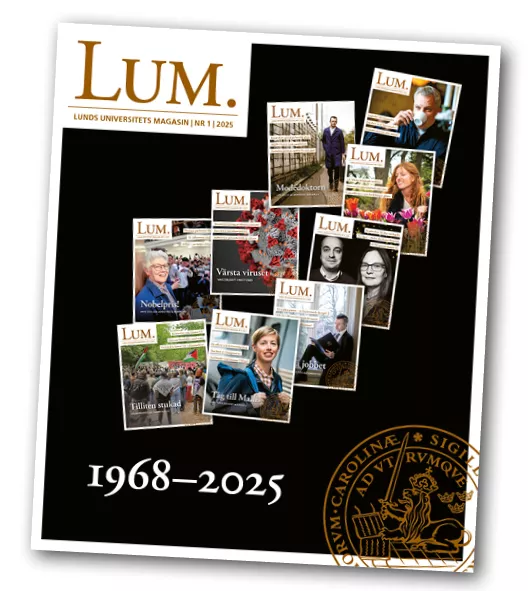The task of the new pro vice-chancellors is now to create better conditions for their areas to develop, and the University’s strategic plan is to be an important signpost in these efforts. The first prioritised point in the plan is that education and research are to be intertwined. “This is to happen in learning environments where both teaching and research take place and where qualifications in education and research are equally well-regarded.”
So how do you see the intertwining of your areas of responsibility?
“We are not too bad at it”, says Mickwitz, referring to examples of how students take part in research projects, but he thinks that this should happen more systematically.
Ann-Kristin Wallengren points out that there is already a distinction between research and education in the allocation of direct government funding.
“There is one sum of money earmarked for research and another for education”, she says.
The national inquiry into governance and resources, “Struten”, proposed the merging of the two allocations of direct government funding, but that didn’t happen.
Grant providers should include education in applications
Wallengren thinks that external grant providers should also include education as part of the application process.
“You could require a report and follow-up of how the grant applied for is to benefit education. And it could be suggested to the Swedish Research Council that this requirement be included in their application criteria”, she says.
Another proposal is to take up issues concerning how research benefits education and vice versa at the faculty and department levels, in staff appraisals.
“As a teaching professor, getting intelligent questions from students is useful”, says Mickwitz. He also thinks that “knowledge has legs” and that research often spreads more rapidly with students, ultimately helping it to benefit society.
“Insofar as students are involved in writing articles, one has to show firmness and integrity and allow the students’ names to be listed first”, adds Mickwitz.
Teaching compels teachers to sharpen their reasoning
Wallengren agrees that it is good for researchers to teach as it compels them to sharpen their reasoning and tighten up their theories. She is also advocating for more research for senior lecturers to create a fertile environment for intertwining.
“You expect everyone to have time to conduct research – but that is not always the case. In some faculties, there is not a lot of leeway for senior lecturers to conduct research, as most of their time goes on teaching and administrative duties.”
The Nobel laureates at MIT usually teach undergraduates
At the large world-leading universities, it is self-evident that professors will meet with students.
“The Nobel laureates at MIT, for example, usually teach undergraduate courses”, says Mickwitz.
Both the pro vice-chancellors agree that teaching should be well-regarded in Sweden as well, and that in some cases it is a question of modernising an ancient Swedish university culture.
Career paths needs re-examining
Wallengren also thinks that career paths need re-examining. Currently, qualifications are almost exclusively acquired through research.
“Rewarding good teaching efforts is important and we will continue working on teaching qualifications as the previous University management had started to do. Approximately half of the faculties have introduced systems for this”, she says, suggesting teaching portfolios as an additional way of better assessing and evaluating teaching.
Taking part in meetings in one another’s boards, the study programmes board and the research board, is another proposal for how to better benefit intertwining in the future.
Ann-Kristin Wallengren: Film scholar who wants to work across faculty boundaries
Ann-Kristin Wallengren is professor of film studies and was most recently pro dean with responsibility for first and second cycle studies at her faculty, humanities/theology. At the top of her agenda is digital examination, which has not been working satisfactorily during the pandemic.
“This is urgent and must be solved immediately, and colleagues in Digital Learning Environments, a development of the Canvas project, are working flat-out on this.”
She also wants it to be easy to work across faculty boundaries and for example to develop cross-faculty courses for which there is currently insufficient organisational administrative support. She is involved in developing the course on “The Aesthetics of Crisis”, 7.5 credits, together with the faculties of law, medicine and fine and performing arts.
“It is incredibly stimulating to work with the breadth of the University”, she says.
Also included in Wallengren’s area of responsibility are the Historical Museum, Skissernas Museum – Museum of Artistic Process and Public Art, Odeum and the Botanical Garden, under the LUKOM umbrella.
She would like to see their activities gaining a larger place among the other education and research offered at the University.
Per Mickwitz: Environmental science professor who wants to connect things in new ways
Per Mickwitz is professor of environmental policy and, two years ago, he succeeded Lena Neij as director of the International Institute for Industrial Environmental Economics, IIIEE. Before that, he had worked for twenty years in Finland’s Environment Institute in Helsinki, a major government research institute. He originally graduated with a degree in economics.
“I have always appreciated Sweden and, in particular, Skåne and Lund”, he explains; over the years he has had several collaboration projects with Lund University.
One thing that struck him when he started working at Lund University is how Swedish everything is in the central administration.
“I am the only international element”, he says with his singsong Finnish-Swedish accent.
“And that is fine as Swedish is my first language. But we are supposed to be an international world-class university…”
He thinks that internationalisation and diversity are important and shares the view of the breadth of the University as a strength for Lund.
“But we should better utilise this breadth; many departments and strong research environments live separate lives and we need to connect things in new ways.”
Now he is awaiting the final report from the RQ20 research evaluation which he expects to play a very important role in his area of responsibility in the future.





